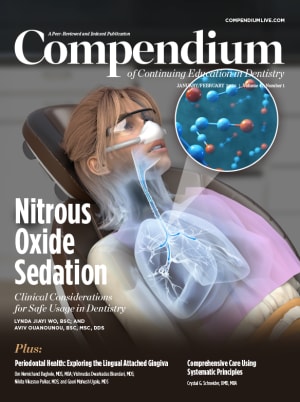Investing in Dental Assistants: Strengthening the Workforce, Enhancing Patient Care
To address this challenge and ensure a stable, thriving dental industry, the profession must invest in DA education, mentorship, and workforce development.
Dental assistants (DAs) are essential to the success of any dental practice. They are the backbone of clinical operations, ensuring efficiency while enhancing patient care. From chairside assisting and infection control to administrative support and patient communication, DAs play a vital role in delivering high-quality care. Despite their contributions, the dental profession faces an ongoing workforce shortage that strains dental teams and can potentially limit patient access to timely care.
To address this challenge and ensure a stable, thriving dental industry, the profession must invest in DA education, mentorship, and workforce development. Removing barriers to entry and creating clear career pathways will help build a strong pipeline of skilled professionals who can support modern dentistry and contribute to better health outcomes.
Shortages and Their Impact
Dental practices across the country report ongoing difficulties in hiring and retaining qualified DAs. According to the Dental Assisting National Board (DANB) and American Dental Association, vacancies in DA positions lead to increased operational costs, reduced patient capacity, and longer hiring timelines.1 The impact on practices is significant for numerous reasons, starting with revenue loss. A practice with an unfilled DA position experiences a 6% daily revenue decrease, amounting to approximately $110,000 in lost annual revenue. Also, it takes an average of 2.5 months to fill a vacant DA position, leading to scheduling inefficiencies and increased workload for existing staff. Operational costs are also impacted; when other team members assume DA responsibilities, practices can incur added costs ranging from $30,000 to $60,000 annually. Finally, nearly 25% of dental practices report that DA shortages force them to reschedule or reduce patient visits, hampering access to care.2
Addressing these shortages requires proactive investment in DA recruitment and retention.
Strategies for Retaining DAs
Recruiting skilled dental assistants is only part of the solution-retaining them is just as critical. High turnover rates can lead to increased costs, disrupted workflows, and diminished patient care. To ensure long-term stability, dental practices must create an environment where DAs feel valued, supported, and motivated to grow in their careers. The following strategies can help practices improve DA retention:
Career development and training. DAs want to advance in their careers, but many lack access to professional growth opportunities. Practices can support career development by encouraging continuing education, offering tuition reimbursement, and providing pathways for specialization, such as pediatric dentistry, orthodontics, or special needs care.
Hands-on training and mentorship.The transition from education to practice can be challenging for new DAs. A structured onboarding program, including externships, mentorship from experienced DAs, and step-by-step training, can ease this transition and improve retention rates.
Competitive compensation and benefits.Fair pay and strong benefits are crucial to retaining skilled DAs. Practices that offer industry-competitive salaries, performance-based raises, and benefits like health insurance, paid time off, and retirement plans are more likely to maintain a stable workforce. Research from DANB indicates that nearly half of DAs leave positions due to feeling undervalued.3
Workplace culture and recognition.A positive and supportive work environment directly impacts DA retention. Practices that encourage teamwork, maintain open communication, and acknowledge employee contributions create a stronger, more motivated team. Public recognition, small incentives, and celebrating milestones can reinforce appreciation and job satisfaction.
By investing in training, career development, and workplace culture, dental practices can create an environment where DAs feel valued and supported in their long-term careers. Retaining skilled DAs not only benefits individual practices but also strengthens the dental industry as a whole.
A Model for Workforce Development
To help address the DA workforce shortage, various industry initiatives have emerged to provide structured training, financial assistance, and career advancement opportunities. One such example is the Dr. Carolyn Ghazal Dental Assistant Scholarship program, which provides tuition assistance, externships, and mentorship to aspiring DAs. Offered through the Pacific Dental Services (PDS) Foundation, a strategic partner of PDS Health™, the program supports workforce development and access to care.
Knowing that finances are often the greatest obstacle for students, the program has awarded more than $2 million in tuition assistance across 26 states since its launch in 2016. As of 2024, it has supported 324 students in building successful careers and strengthening the pipeline of skilled professionals entering the dental field.
A well-trained, motivated dental assistant can transform a practice. Investing in DAs doesn't just support individuals, but bolsters the entire dental profession by improving access to care, elevating patient experiences, and reducing staffing challenges for providers. Through mentorship and hands-on training, initiatives like that of the PDS Foundation are helping students build the confidence and skills they need for long-term success while enabling dental practices to create strong, sustainable teams.
Conclusion
The need for skilled DAs has never been greater. Investing in the DA workforce must be a financial and strategic priority for dental practices nationwide. Programs that provide structured workforce development, mentorship, and financial support serve as scalable models for addressing workforce challenges and ensuring the long-term sustainability of the dental profession.
About the authors
Michael M. Le, MBA, JD
Executive Director, Pacific Dental Services Foundation, Irvine, California
Rosalinda Olague, RDA, MBA, PhD(c)
Director, Dental Assistant Programs and School Relations, PDS Health, Henderson, Nevada
